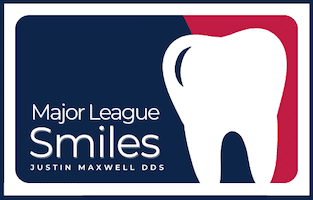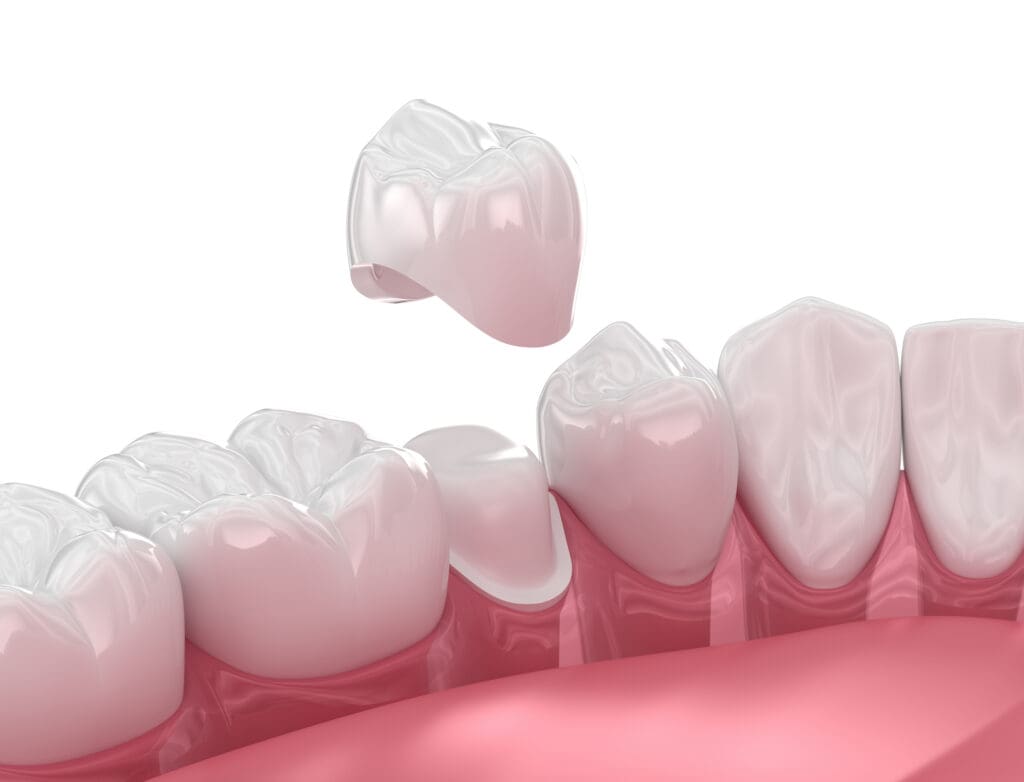A dental crown is a common and effective solution for restoring damaged teeth. This dental procedure helps in improving both the function and appearance of your teeth. Dr. Justin Maxwell places dental crowns to restore your dental health or to address cosmetic concerns.
Dental Crowns in Ellicott City, MD
Dental crowns are a common and all-around solution in restorative dentistry. They protect damaged or weakened teeth after root canals, and restore worn teeth. A dental crown is a custom-made cap that fits over a tooth to fix its shape, size, strength, and appearance. The crown encases the entire visible part of the tooth above the gum line. Crowns can consist of various materials like metals, porcelain, resin, or a combination of them.
Why Are Dental Crowns Used?
Dental crowns are used for both restorative and cosmetic reasons:
- Protection: They protect a tooth that has been weakened by decay or a large filling. For instance, a crown reinforces a tooth and prevents it from fracturing after a root canal treatment.
- Restoration: Crowns restore the shape and size of a tooth that has been damaged or worn down. This helps in restoring normal function and look.
- Cosmetic Improvement: Crowns improve the appearance of discolored or misshapen teeth. Porcelain crowns are particularly popular for front teeth because they look so natural.
- Supporting Dental Bridges: Crowns can anchor a dental bridge in place to replace one or more missing teeth.
- Covering Implants: Implant-supported crowns can replace single missing teeth. A dental implant permanently replaces a lost tooth and doesn’t need special care.
Understanding Your Dental Crown Options
When you need a dental crown, you have several material choices. Dr. Maxwell will help you select the best option based on where the tooth is and how visible it is when you smile.
For back teeth that endure heavy chewing, often gold or other strong alloys are best because they’re extremely durable and long-lasting. However, their shiny metallic color makes them less popular for visible front teeth.
Porcelain-fused-to-metal crowns are best for both strength and a natural look. These have a metal base for durability with a porcelain outer layer that can match your tooth color. They work well for back teeth but can sometimes show a thin dark line near the gums over time.
For front teeth where appearance matters most, all-porcelain crowns provide the most natural-looking results. They blend seamlessly with your other teeth but may not be quite as strong as metal options.
The most affordable option is resin crowns, but they tend to wear down faster than other types. Dr. Maxwell will explain all these choices and help you pick what’s best for your smile, budget, and lifestyle.
Today’s crowns look more natural and last longer than ever before. With proper care, your new crown can protect your tooth for many years while keeping your smile looking great.
The Crown Placement Procedure
The process for placing a traditional dental crown includes two office visits to complete.
- Initial Assessment: Dr. Maxwell will examine your tooth and take X-rays to assess the extent of damage and see if a crown is best.
- Tooth Preparation: The tooth is shaped to accommodate the crown. This involves removing some of the tooth structure to ensure a proper fit for the crown.
- Impression: Dr. Maxwell will take an impression of your tooth. Then uses it to create your custom crown. In some cases, he may take digital impressions for greater precision.
- Temporary Crown: While the permanent crown is being made, he will place a temporary crown to protect the prepared tooth.
- Crown Placement: Once the permanent crown is ready, it’s fitted, adjusted for proper fit and bite, and cemented into place.
- Follow-Up: A follow-up visit may be scheduled to ensure you’re healthy and to address any issues.
Dental Crown Care and Maintenance
With proper dental care, dental crowns can last between 5 to 15 years or more. It’s super easy to take care of your new crown. Brush twice a day and floss daily, especially around the crown to prevent plaque buildup and gum disease. Avoid hard foods because chewing on them or hard objects can damage your crown.
Also, visit your dentist regularly. Regular dental visits help make sure that your crown and the tooth underneath it is in good condition. We can address any potential issues promptly as well.
Frequently Asked Questions
How long does it take to get a dental crown?
The process usually takes two visits over about 2 weeks. At your first appointment, Dr. Maxwell prepares your tooth and takes impressions. You’ll wear a temporary crown for 1-2 weeks while your permanent crown is custom-made. At your second visit, we will securely bond your permanent crown in place.
Will my crown look natural?
Today’s crowns, especially porcelain ones, match your teeth in color, shape, and texture. Dr. Maxwell carefully selects shades to blend with your smile. Most people won’t be able to tell which tooth has a crown once it’s placed.
Does getting a crown hurt?
You shouldn’t feel pain during the procedure because we numb the area completely. Some patients feel mild sensitivity or discomfort after the anesthesia wears off, but this usually goes away in a day or two. Over-the-counter pain relievers typically help if needed.
How do I care for my new crown?
It’s simple, just care for it like a real tooth. Brush twice daily with fluoride toothpaste and floss carefully around the crown every day. Avoid chewing on very hard things, and wear a night guard if you grind your teeth at night. Keep up with regular dental cleanings and checkups with Dr. Maxwell.
What foods should I avoid with a crown?
While crowns are strong, it’s best to avoid sticky foods like caramel that could pull on the crown. Hard foods like ice or nuts could chip it, so be careful when eating those. Your temporary crown is more delicate, so be extra careful until you get your permanent one.
How long do dental crowns last?
With proper care, crowns typically last 5-15 years. Porcelain crowns often last 10+ years, while gold crowns can last 20+ years. Your crown’s lifespan will depend on your oral hygiene, eating habits, and regular dental visits to check its condition.
Can a crowned tooth still get cavities?
Yes, the tooth underneath can still decay at the gumline where the crown meets your tooth. That’s why brushing, flossing, and regular cleanings are so important. If decay develops under a crown, we may need to replace it to treat the problem.
What’s the difference between a crown and a filling?
Fillings repair smaller areas of decay by filling in the hole. Crowns cover and protect the entire tooth when there’s too much damage for a filling to work well. Crowns are stronger and better for teeth that have had root canals or large fillings.
Dental crowns are an effective and reliable solution for various dental issues, offering both functional and aesthetic benefits. Whether you need to protect a weakened tooth, restore a damaged one, or enhance your smile, crowns can help. Schedule a visit to Dr. Maxwell’s Ellicott City dental office by calling (443) 335-8726 or request an appointment online anytime.

